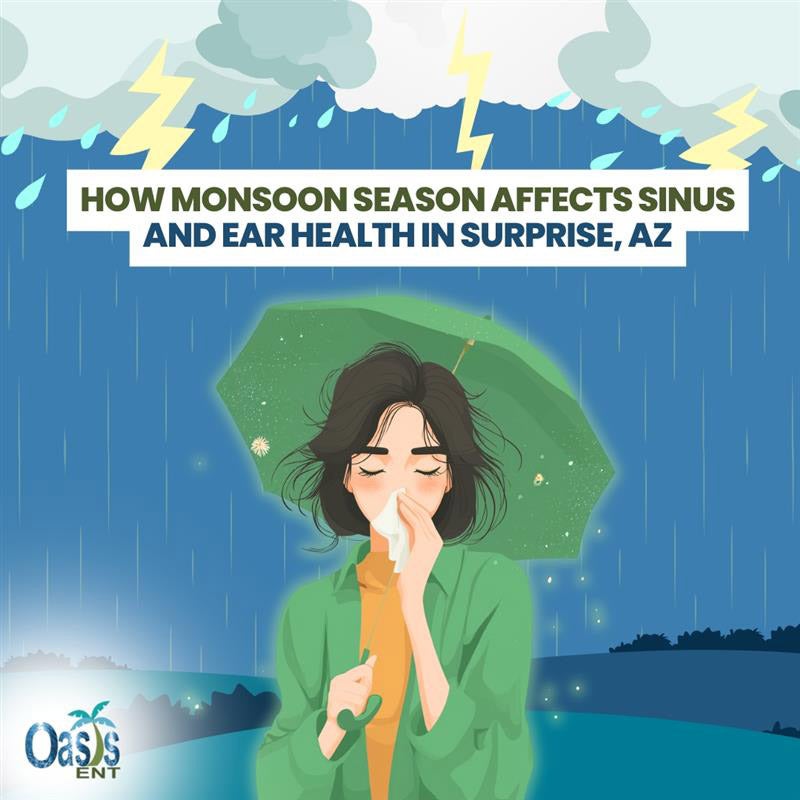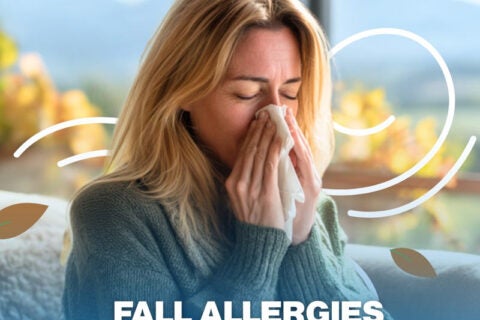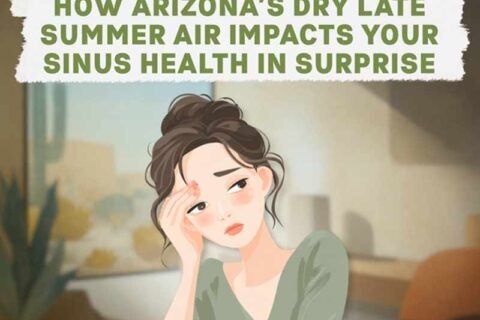How Monsoon Season Affects Sinus and Ear Health in Surprise, AZ
Monsoon season in Surprise, Arizona brings cooler temperatures and welcome rainfall—but also a surge in sinus and ear issues for many local residents. While the relief from summer heat is nice, the rise in humidity, allergens, and barometric pressure changes can make life difficult for those with sinus congestion, ear discomfort, or allergy symptoms.
At Oasis ENT, we help patients in Surprise and nearby communities understand how seasonal weather patterns like Arizona’s monsoon can affect ear, nose, and throat health—and how to find lasting relief.

What Is Monsoon Season in Arizona?
Arizona’s monsoon season runs from June 15 through September 30 and is marked by:
- High humidity
- Sudden storms and heavy rainfall
- Seasonal wind shifts
These weather changes can create barometric pressure fluctuations and raise the risk of allergy and infection-related ENT symptoms, especially for people with chronic sinus or ear conditions.
How the Monsoon Affects Sinus and Ear Health
Barometric Pressure Shifts
Rapid pressure changes between the external environment and your sinus or ear cavities can lead to:
- Sinus pressure or headaches
- Persistent nasal congestion
- Ear fullness or pain
- Problems with Eustachian tube function, which helps equalize pressure in the middle ear
This is especially common during stormy weather or abrupt temperature drops.
Increased Humidity
While dry air is often blamed for sinus issues, sudden humidity spikes can also create problems:
- Swollen, inflamed sinus passages
- Blocked mucus flow, creating a breeding ground for bacteria
- Higher risk of bacterial or fungal ear infections
Symptoms may include:
- Ear pain or fluid drainage
- Temporary hearing loss
- Sinus headaches or facial pressure
Airborne Allergy Triggers
During monsoon season, high winds can stir up:
- Pollen
- Dust mites
- Mold spores
- Other airborne irritants
These allergens can trigger nasal inflammation and increase the risk of secondary sinus or ear infections—especially if left untreated.
✅ Tips to Manage Sinus and Ear Health During Monsoon Season
Protecting your sinuses and ears during this season starts with the right habits:
- Stay well-hydrated to keep mucus thin and flowing
- ️ Use saline nasal sprays to flush out allergens and reduce inflammation
- ️ Use a dehumidifier to prevent mold and reduce indoor humidity
- Clean frequently to reduce indoor allergens like dust and pet dander
- Boost your immunity through proper sleep, a healthy diet, and regular exercise
- Dry your ears gently after showering or swimming to avoid bacterial growth
- ❌ Avoid cotton swabs—they can push wax and bacteria deeper into the ear canal
- ⚠️ Don’t ignore persistent symptoms. If you’re experiencing ongoing sinus pressure, ear pain, or headaches, seek professional ENT care
How Oasis ENT Supports Surprise, AZ Residents
At Oasis ENT in Surprise, we offer:
- Comprehensive exams for sinus and ear health
- In-office imaging and diagnostics
- Allergy testing and treatment plans
- Care for chronic sinusitis, ear infections, and seasonal allergies
- Guidance on weather-related ENT symptom management
Whether you’re dealing with monsoon-related sinus issues, ear pressure, or seasonal allergies, our team is here to help you feel better—fast.
Take Control of Your Sinus and Ear Health This Monsoon Season
You don’t have to wait until your symptoms worsen. If you’re feeling the effects of monsoon weather in your sinuses or ears, Oasis ENT in Surprise, AZ is here to help.
Serving Surprise and surrounding West Valley communities, we specialize in weather-sensitive ENT care that helps you breathe, hear, and feel better year-round.
Call us today or request a consultation online to start your personalized ENT care plan.
The information provided in this article is for informational and educational purposes only and does not constitute medical advice. It is not intended to diagnose, treat, cure, or prevent any disease or medical condition. Always seek the guidance of your physician or other qualified healthcare provider with any questions you may have regarding a medical condition or treatment.
Results may vary: Treatment outcomes and health experiences may differ based on individual medical history, condition severity, and response to care.
Emergency Notice: If you are experiencing a medical emergency, call 911 or seek immediate medical attention.


